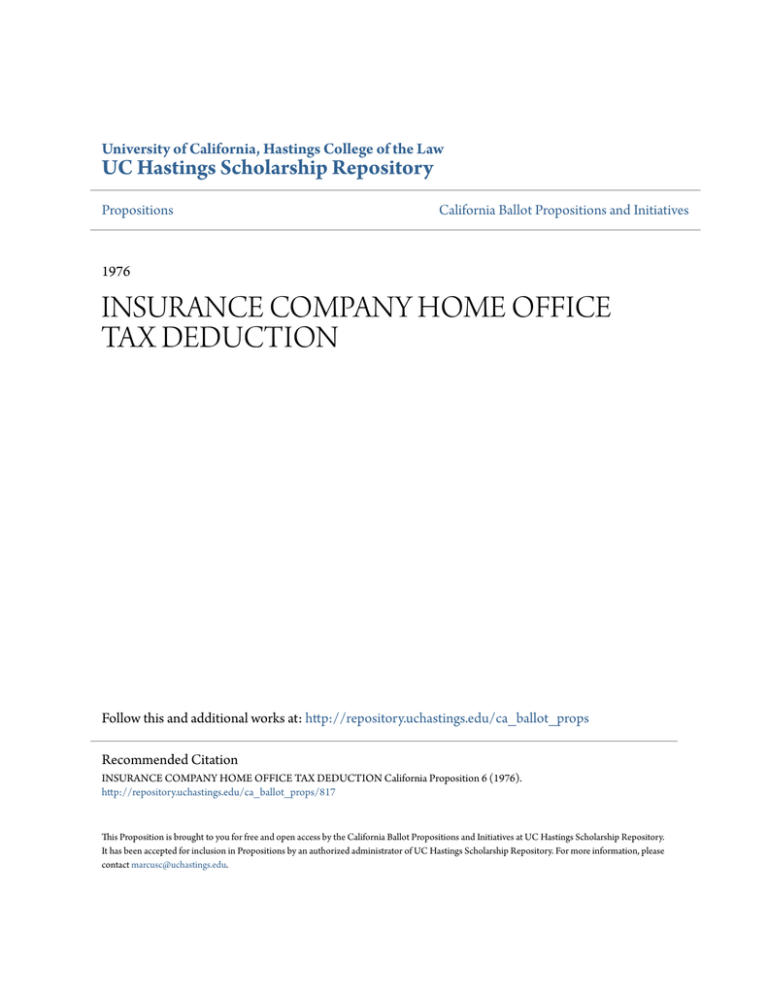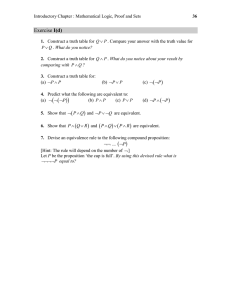insurance company home office tax deduction
advertisement

University of California, Hastings College of the Law UC Hastings Scholarship Repository Propositions California Ballot Propositions and Initiatives 1976 INSURANCE COMPANY HOME OFFICE TAX DEDUCTION Follow this and additional works at: http://repository.uchastings.edu/ca_ballot_props Recommended Citation INSURANCE COMPANY HOME OFFICE TAX DEDUCTION California Proposition 6 (1976). http://repository.uchastings.edu/ca_ballot_props/817 This Proposition is brought to you for free and open access by the California Ballot Propositions and Initiatives at UC Hastings Scholarship Repository. It has been accepted for inclusion in Propositions by an authorized administrator of UC Hastings Scholarship Repository. For more information, please contact marcusc@uchastings.edu. INSURANCE COMPANY HOME OFFICE TAX DEDUCTION Ballot Title INSURANCE COMPANY HOME OFFICE TAX DEDUCTION. LEGISLATIVE CONSTITUTIONAL AMENDMENT. Repeals and amends portions of Article XIII, section 28, to eliminate income tax deduction presently given insurance companies for real property taxes paid on insurers' home or principal office in California. Financial impact: The adoption of this measure will incr(;'ase state General Fund revenues by approximately $19 million during the first year and this increase will probably grow thereafter. FINAL VOTE CAST BY LEGISLATURE ON SCA 12 (PROPOSITION 6): ASSEMBLY-Ayes, 76 SENATE-Ayes, 30 Noes, 0 Noes, 3 Analysis by Legislative Analyst PROPOSAL: The Constitution currently requires that insurance companies doing business in California pay a state tax which is determined by the amount of premiums they collect in the state. Insurance companies also pay local property taxes on land and buildings owned by them, but their personal property is exempt. If an insurance company owns rather than rents its principal office in California, the Constitution provides that the company may subtract from its state premiums tax the amount of its local property tax. This is called the "principal office deduction". The company can subtract all of its property taxes on the principal office if it occupies all of the building. Certain California insurance companies also are allowed the full deduction even though they occupy only a portion of the building. Other California insurance companies and out-of-state insurance firms can subtract only a portion of the property taxes if they do not occupy the €;ntire building. In 1974 there were 909 active insurance companies operating in California. One hundred and twenty-seven of these firms owned their principal office building and therefore claimed the property tax deduction. Fifteen of these firms paid no state tax because the principal office deduction exceeded their premiums tax liability. This proposition will eliminate the home or principal office deduction currently available to insurance companies. FISCAL EFFECT: This proposition will increase state revenues from the insurance tax by approximately $19 million in the first year and by increasing amounts annually thereafter. There will be no effect on local government costs or property tax revenues. Remember to Vote on Election Day Tuesday, June 8, 1976 26 Text of Proposed Law This amendment proposed by Senate Constitutional Amendment No. 12 (Statutes of 1975, Resolution Chapter 116) amends an existing section of the Constitution. Existing provisions proposed to be deleted are printed in sh'Heeetit t)'pe. Itppliellhle te 9tIeIt reM p r = eeetipiea h,.1t a_She iftstH'ep ItS its heMe e8iee eP pPifteip81 itt thiit Mete 8ft ~ I; ~ eP te 9tIeIt reM p.epert) tIfI8It whieft eeMtNetieR M the heMe eAtee eP priReipftl: eAiee M the a8lllestie iMttI'eP eMBffleReed tJPiet' te ~ I; ¥.RQ. As U8ed itt tIMtCra~, "delftestie iftsttrep!: eft iMttreP ergttRilied tIftdep laws M this Mete aM 4ieeMeti te ~ Hl!Itll'ftftee itt this Mete 8ft eP hefere Qeeertthe. 31; W6S: ~ !I=he phrase ~ eP I'ElP!I8ItS eMlet' tMR the iftsttrep!: ItS U8ed itt pltPftgl'8ph ~ M this ~;iMeR sheD ftel tReltt6e ~ ftft8lhep instIPltftee e8lllp1tft) eP ttsseeitltieR ttIIiIitttee direetl,. eP iReireetl, with the iMttreP ~ 8ireet eNftefship eP eelftlfteR ewttet'St-.->p eP eeMreI; eP ~ the eerpet'ftte eP ether ftl8ft~f M the ittsttref' te the effteRt M its ill!ltlrltftee ftl-reot 8eh~he8. =Ate Le~18ttl.e Ift8Y 8eMe the teftftS U8ed itt . pttragrllph fer the l!ele ~ M feeilittthRg the eperttti8ft M thispttr8gt'ltph. . Second-That subdivision (g) of Section 28 of Article XIII is amended to read: (g) Every insurer transacting the business of ocean marine insurance in this state shall annually pay to the state a tax measured by that proportion of the underwriting profit of such insurer from such insurance Vl-Titten in the United States, which the gross premiums of the insurer from stich insurance written in this state bear to the gross premiums of the insurer from such insurance written within the United States, at the rate of 5 per centum, which tax shall be in lieu of all other taxes and licenses, state, county and municipal, upon such insurer, except taxes upon real estate, and such other taxes as may be assessed or levied against slIch insurer on account of any other class of insurance written by it. Qeatle88ftS freRt the ItftfttiItl tIt!t ptll'!ftlftftt te 8t1hei. meR -W etlftftel he fttftde freRt the _ _ fftttfifte tft!t, The Legislature shall define the terms "ocean marine insurance" and "underwriting profit," and shall provide for the assessment,levy, collection and enforcement of the ocean marine tax. ~olls are·open from 7 A.M. to 8 P.M. 21 [ 6] Insurance Company Home Office Tax Deduction Argument in Favor of Proposition 6 This measure would repeal a 65-year old tax loophole which allows a few big insurance companies to escape paying their fair share of state taxes. In the past 25 years alone, this special treatment has cost the state more than $100 million in tax income. Elimination of the scrcalled home office deduction would boost state income by $23 million next year alone. By this device, one giant firm built a skyscraper for its home office in California and was able to avoid paying any state taxes at all for one year when its bill otherwise would have been more than $444,000. The home office deduction was enacted in 1910 with the ostensible purpose of luring insurance business to California. But such an incentive has proved to be a failure in this modem age. Only three other states have the deduction and they have only a fraction of the insurance market. On the other hand, a major insurance state such as Connecticut offers no such special attraction. It is time finally to remove this special tax privilege. Vote yes on Proposition 6. EDMUND G. BROWN JR. GolWD(K of CaIiFornM DAVID A. ROBERTI Member of the Senate, 27th District ALAN SlEROTY Member of the Assembly. 41th District Rebuttal to Argument in Favor of Proposition 6 The argument in favor of Proposition 6 states that a yes vote will lead to a $23 million annual increase in insurance taxes. If you are against tax increases and are concerned about keeping your insurance costs down, VOTE NO on Proposition 6. The argument in favor accuses insurance companies of escaping their fair share of state taxes. The fact is that insurance companies not only pay their full share of property taxes, but also pay twice as much in state taxes as other businesses. Proposition 6 is a tax increase, not tax reform. True tax reform would place insurance companies on the same tax basis as other companies. All businesses in California are allowed to deduct their local property taxes and other business expenses from their state taxes. For insurance companies, the Principal Office Deduction is the only deduction allowed. The Principal Office Deduction has served as a major incentive for insurance companies to locate and expand 28 in California. The insurance industry currently employs approximately 100,000 Californians and supplies more than $20 billion in capital to fuel our economic growth. The passage of Proposition 6 will undermine California's economy and may force insurance companies and jobs out of our state. An admitted purpose of Proposition 6 is to raise tax by $23 million. California already collects more in insurance taxes than any other state in the nation. Vote against increasing the burden on taxpayers and consumers by voting NO on Proposition 6. H. L. RICHARDSON Member of the SemIte, 19th District CHARLES A. O'BRIEN Former CIUeF Deputy Attorney General of CaliFomia MARIBES BRENNAN, President Democratic Womens Forum Arguments printed on this page are the opinions of the authors and have not been checked for accuracy by any official agency. Insurance Company Home Office Tax Deduction Argument Against Proposition 6 VOTE NO on this proposition unless you want a $20 million dollar tax increase. This so-called closing of a loophole really will place an added burden on consumers because premiums will be increased for insurance on homes, health and autos. In the case of life insurance and insured retirement plans, this increase can be added only to the premiums for new policies. Obvicusly, these added costs will bear most heavily on younger families and on people who are purchasing retirement plans for the first time. People in both these categories are the ones who usually can least afford increased costs. Calling the principal office deduction a "loophole" is highly misleading. Insurance companies pay their full share of local property taxes. In addition, Califomia insurers, whether in nonprofit mutuals or stock companies, are subject to a very heavy tax on each dollar of premium paid by policyholders. In fact, the premium tax in California is the equivalent of a net income tax rate more than twice that paid by other corporations. Yet, companies selling health care "coverage" and calling it medical or hospital "service" escape all state taxation. They pay ZERO state tax, a true "loophole" nee this exemption never was approved by the people or the Legislature. However, the principal office deduction, even though specifically approved by California voters in 1966, is called a "loophole" and is proposed for repeal. The only fair system of insurance taxation would require a changeover from taxing premiums to taxing insurance compL.Ily profits. Passage of this proposition will mean an added tax on actual dollars paid by people to assure their continued access to life's necessities, such as doctor or hospital services, savings for higher education, protection against accidents and the untimely loss of breadwinners. These necessities should not be taxed any more than food is directly taxed. The people in Sacramento who want the added $20 million in revenue to be generated by this proposition don't call it a tax increase. But insurance consumers, which includes most families, will be stuck with higher premiums. Every voter who relies on insm ance for protection and l>avings should vote "NO" on this tax increase. H. L RICHARDSON Member of the Senate, 19th District CHARLES A. O'BRIEN FOI7IIe#" Q,ieF Deputy Attorney Cerrenl of CaliFornill MARIBES BRENNAN, President Democratic Womens FOIum Rebuttal to Argument Against Proposition 6 Only one of every eight insurance companies in California now enjoys the unjust tax break that Proposition 6 seeks to repeal. This is not only unfair to the average taxpayer, but gives an unwarranted competitive advantage to these specially privileged companies. Sen. Richardson claims that Proposition 6 win increase your insurance costs but since seven of every eight insurance companies are unaffected by this Proposition, the argument is specious. EDMUND C. BROWN JR. Governor of CaliFornia DAVID A. ROBERTI Member of the Senate, 27th DisIrict ALAN SIEROTY Member of the Assembly, 41th District Arguments printed on this page are the opinions of the authors and have not been checked for acc.-uracy by any official agency. 29







